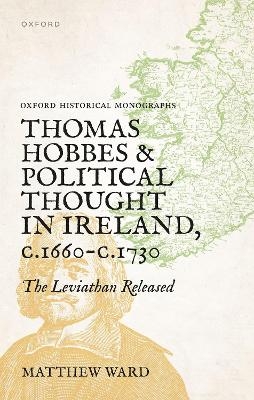
Thomas Hobbes and Political Thought in Ireland c.1660- c.1730
Oxford University Press (Verlag)
978-0-19-890412-0 (ISBN)
Thomas Hobbes and Political Thought in Ireland, c.1660-1730 is a history of political thought in Ireland, told from the perspective of the reception in that country of Thomas Hobbes, the English philosopher. Unlike Hobbes, political thought in Ireland has received little attention from historians: it is sometimes assumed that there is not much of a subject to study. The reception of Hobbes in Ireland forces us to challenge this assumption.
To begin with, Matthew Ward highlights the variety and sophistication of political thought in Ireland. In his political thought, Hobbes was preoccupied by sovereignty, which he conceptualized in terms of natural law and made the defining characteristic of the commonwealth, or the 'Leviathan'; but he applied his concept of sovereignty to a broad range of political issues. His political thought was also part of a wider philosophical system which comprehended history, theology, natural philosophy, and mathematics. They may have been fewer than their counterparts in England, but Hobbes's readers in Ireland read him closely and compulsively. Indeed, they often fixated on his treatment of subjects, such as taxation, corporations, and the organization of empire, that were overlooked by his readers in England.
The reception of Hobbes in Ireland also tells, therefore, of the distinctiveness of Ireland as a context of political thought. Hobbes's readers in Ireland were not only concerned with a distinctive selection of subjects; they also received Hobbes more positively than his readers in England. In England, Hobbes's concept of sovereignty was reviled for emasculating Parliament, the Anglican Church, and the common law. Too compelling to ignore, the 'Leviathan' had to be 'tamed'. In Ireland, where these institutions were weaker, the 'Leviathan' could be released.
The key figures in the reception of Hobbes in Ireland in this period- Sir William Petty, John Vesey, and Edward Synge- were of different generations and political contexts. All three, however, engaged with aspects and implications of Hobbes's concept of sovereignty, to which they more sympathetic than their English contemporaries, to intervene in Irish politics. They prompt us to consider the geography of the discourse of sovereignty in the British world, not only in those days, but also in these.
Matthew Ward took a BA in History and Politics from the University of York and an MPhil in Political Thought and Intellectual History, supervised by Professor John Robertson, from Clare College, Cambridge. After Cambridge, Matthew worked in the House of Commons. In 2016, he was awarded the Oxford-Vincent Packford and Geoffrey Smart Scholarship at Kellogg College, Oxford to study for a DPhil in History under Professor Jon Parkin. While at Oxford, Matthew also held a fellowship at Christ Church dedicated to increasing access to the university for state school pupils. He is now a Civil Servant.
Abbreviations
Conventions
Introduction
1: Sir William Petty, the Restoration in Ireland, and the corporate commonwealth
2: Sir William Petty, the Cabal ministry, and the government of empire
3: Sir William Petty, the 'sceptical-Tories', and the government of the sea
4: John Vesey and Anglican royalist discourse in Restoration Ireland
5: John Vesey and the 'Revolution' of 1688
6: Edward Synge and 'Hobbian' discourse in early eighteenth-century Ireland
Conclusion
Bibliography
| Erscheinungsdatum | 27.01.2024 |
|---|---|
| Reihe/Serie | Oxford Historical Monographs |
| Verlagsort | Oxford |
| Sprache | englisch |
| Maße | 145 x 224 mm |
| Gewicht | 500 g |
| Themenwelt | Geschichte ► Allgemeine Geschichte ► Neuzeit (bis 1918) |
| Geisteswissenschaften ► Geschichte ► Regional- / Ländergeschichte | |
| Geschichte ► Teilgebiete der Geschichte ► Kulturgeschichte | |
| Geisteswissenschaften ► Philosophie | |
| ISBN-10 | 0-19-890412-6 / 0198904126 |
| ISBN-13 | 978-0-19-890412-0 / 9780198904120 |
| Zustand | Neuware |
| Informationen gemäß Produktsicherheitsverordnung (GPSR) | |
| Haben Sie eine Frage zum Produkt? |
aus dem Bereich


